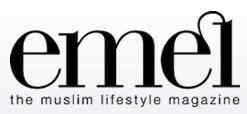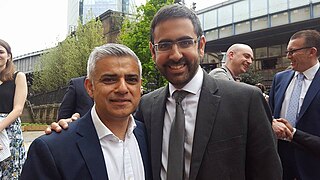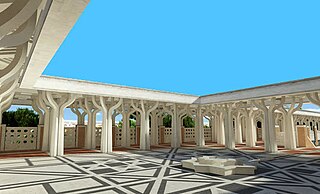Related Research Articles
Islamophobia is the fear of, hatred of, or prejudice against the religion of Islam or Muslims in general, especially when seen as a geopolitical force or a source of terrorism.

Islam Channel is a UK-based, free-to-air, English language, Islamic-focused satellite television channel and online media platform funded by advertising and donations. It was founded in 2004 by Mohamed Ali Harrath, a Tunisian activist and businessman; his son, Mohamed Harrath, is now its Chief Executive Officer. It was reported in 2008 that UK government research found that 59% of British Muslims watched the channel. It broadcasts across Europe, the Middle East and Africa, and is streamed live on the internet. Islam Channel began broadcasting in March 2004 on Sky Digital channel 836, but subsequently moved to channel 813, then 806, now 737. In April 2010, it launched on Freesat channel 693. In 2015, Islam Channel Urdu was launched. In 2017 both channels launched on Virgin Media; Islam Channel can be watched on 838 and Islam Channel Urdu on 839. In 2018 Islam Channel Urdu was subsequently moved to channel 851, then 766, now 755. On 18 October 2022, Islam Channel Bangla was launched on Sky 784.

emel is a defunct British lifestyle magazine that reported on contemporary British Muslim culture. The final issue appeared in January 2013.

Faisal Islam is a British political and economics journalist who is the economics editor of BBC News and the occasional presenter of Newsnight. He was the political editor of Sky News from 2014 to 2019, and from May 2004 was business correspondent and later economics editor of Channel 4 News until June 2014.
The International Free Press Society (IFPS), founded on 1 January 2009, is a creation of the Danish Free Press Society. The stated purpose of IFPS "is to defend freedom of expression wherever and by whomever it is threatened".
The National Association of Muslim Police (NAMP) is a British organisation for Muslim police officers. It represents more than 2,000 members and was founded in 2007.
The Muslim News is a monthly and digital newspaper. Established by Ahmed J. Versi in February 1989, it has grown to become the largest monthly ethnic paper in the UK. It describes itself as, "The only independent monthly Muslim newspaper in the UK, that is not backed by any country, organisation or party."

The Muslim Jesus is a 2007 British documentary directed and produced by Irshad Ashraf, and commissioned and narrated by Melvyn Bragg. The documentary is about the Islamic view of Jesus. It was broadcast by ITV on 19 August 2007.

American Muslims often face Islamophobia and racialization due to stereotypes and generalizations ascribed to them. Due to this, Islamophobia is both a product of and a contributor to the United States' racial ideology, which is founded on socially constructed categories of profiled features, or how people seem.
Islamophobia in Australia is highly speculative and affective distrust and hostility towards Muslims, Islam, and those perceived as following the religion. This social aversion and bias is often facilitated and perpetuated in the media through the stereotyping of Muslims as violent and uncivilised. Various Australian politicians and political commentators have capitalised on these negative stereotypes and this has contributed to the marginalisation, discrimination and exclusion of the Muslim community.
Islamophobia in the media refers to negative coverage of Islam-related topics, Muslims, or Arabs by media outlets in a way that is hostile, untrue, and/or misleading. Islamophobia is defined as "Intense dislike or fear of Islam, especially as a political force; hostility or prejudice towards Muslims", and the study of how and to what extent the media furthers Islamophobia has been the subject of much academic and political discussion.
Islamophobia in the United Kingdom refers to a set of discourses, behaviours and structures which express feelings of anxiety, fear, hostility and rejection towards Islam or Muslims in the United Kingdom. Islamophobia can manifest itself in a wide range of ways; including, discrimination in the workforce, negative coverage in the media, and violence against Muslims.

Hizb ut-Tahrir Britain is the British branch of Hizb ut-Tahrir, a transnational, pan-Islamist and fundamentalist group that seeks to re-establish "the Islamic Khilafah (Caliphate)" as an Islamic "superstate" where Muslim-majority countries are unified and ruled under Islamic Shariah law, and which eventually expands globally to include non-Muslim states such as Britain.

Farid Hafez is an Austrian political scientist and holds the endowed chair of Class of 1955 Distinguished Visiting Professor of International Studies at Williams College and Senior Researcher at Georgetown University's The Bridge Initiative. Before his role at Williams College, he was at the Department of Political Science and Sociology at the University of Salzburg.

Miqdaad Versi is director for media monitoring at the Muslim Council of Britain. As well as holding the position as one of the council's active public representatives, Versi is also engaged with the media voicing concerns over the misrepresentation of Muslims. The Guardian described him as "the UK’s one-man Islamophobia media monitor."

The True Blue Crew (TBC) is an Australian far-right extremist group. Members and supporters have been linked to right-wing terrorism and vigilantism, and members have been arrested with weapons and on terrorism-related charges. Experts who have studied the group say it appears to be "committed to violence". The Global Project Against Hate and Extremism (GPAHE) released a report on October 5, 2022, in which it classified the True Blue Crew as a "white nationalist," "anti-immigrant," and "anti-Muslim" group.
Allegations of Islamophobia in the UK Conservative Party have been made, including against senior politicians, such as Boris Johnson, Michael Gove and Zac Goldsmith.
Islamophobia in France holds a particularly political significance since France has the largest proportion of Muslims in the Western world, primarily due to the migration from Maghrebi, West African, and Middle Eastern countries. The existence of discrimination against Muslims is reported by the media in the Muslim world and by the perceived segregation and alienation of Muslims within the French community. The belief that there is an anti-Muslim climate in France is heavily criticised by some members of the French Muslim community who terms it an 'exaggeration'.

Islamophobia is characterized by a hatred against the religion of Islam and those perceived to be following the religion, typically fueled by fear and hatred and sustained through the evolving stereotype of the Muslim identity. It has become increasingly common and widespread throughout the world, in particular since the September 11 attacks in the United States, however it existed in society before this. In Europe, there has been an increase in cultural tensions between national majorities and marginalized Muslim countries, as shown by the results of the 2009 elections in the European Parliament with a large vote toward anti-immigration. Within Italy, there is a large Islamic presence of approximately 1.25 million people, stemming from the widespread migration and settlement that began in the 1970s, in particular from North Africa. The Islamic population of Italy increasingly faces challenges when it comes to their position in society, with the increasing cultural hostility that stems from the growing presence of Islamophobia. Islamophobia has been present within Italy for many years; for example, in the 1920s, Muslims were not permitted to settle in the country due to their religion being viewed as "against common morality." The intensity of Islamophobia in Italy is enhanced by the historical religious structure of the state – which is heavily based on the Catholic Church.
Islamophobia in Poland is the fear, hatred of, or prejudice against the Islamic religion or Muslims in Poland. Since the Muslim community in Poland is small the situation has been described as "Islamophobia without Muslims". According to Monika Bobako, Islamophobia is one of the main elements of the Polish nationalist discourse. Islamophobia in Poland takes the form of racism and xenophobia towards Muslims or those perceived as Muslim.
References
- ↑ "A Week In The Life Of Ahmed Versi | Week In The Life Of | Real Lives | May / Jun 2004 | emel - the muslim lifestyle magazine". www.emel.com. Retrieved 2019-02-08.
- 1 2 3 4 5 6 7 "Ahmed Versi: My Life In Media" . The Independent. 2007-01-15. Archived from the original on 2020-11-10. Retrieved 2019-02-08.
- 1 2 Versi, Ahmed (2002-06-17). "No faith in the media". The Guardian. ISSN 0261-3077 . Retrieved 2019-02-28.
- 1 2 "Faith & Reason: What Robert Kilroy-Silk needs now is a trip to Mecca" . The Independent. 2004-01-24. Archived from the original on 2020-11-10. Retrieved 2019-02-28.
- 1 2 "Ahmed Versi – Camp UK" . Retrieved 2019-02-08.
- ↑ "Judges for 2017 competition announced | Young Muslim Writers Awards" . Retrieved 2019-02-08.
- ↑ "Why Muslims mistrust Blair on terror". 2002-12-23. Retrieved 2019-02-28.
- ↑ Ahmad, Fauzia (2006-08-01). "British Muslim Perceptions and Opinions on News Coverage of September 11". Journal of Ethnic and Migration Studies. 32 (6): 961–982. doi:10.1080/13691830600761479. ISSN 1369-183X.
- 1 2 "Ahmad Versi interviewed in Spanish newspaper" . Retrieved 2019-02-28.
- 1 2 "'There'll always be some kind of racism in society', says Muslim editor". talkradio.co.uk. Retrieved 2019-02-28.